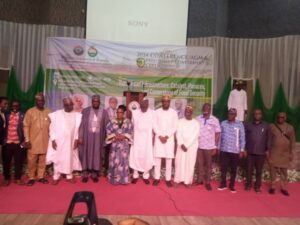
Expert seeks global effort to eliminate Parkinson’s disease
A Consultant Neurologist, Dr Agabi Osigwe, says a collective global efforts is needed to eliminate the Parkinson’s pandemic, now that the world is currently witnessing its start.
Osigwe, who works at the Lagos University Teaching Hospital (LUTH), made this assertions in an interview with the News Men on Tuesday in Lagos.
He spoke in commemoration of the World Parkinson’s Day celebrated annually on April 11 to bring attention to the medical condition.
Parkinson’s disease is a brain disorder that causes unintended or uncontrollable movements, such as shaking, stiffness and difficulty with balance and coordination.
The World Health Organisation (WHO) report of June 2022 stated that globally, disability and death due to the disease are increasing faster than for any other neurological disorder.
According to the report, the disease’s prevalence doubled in the past 25 years.
It also stated that global estimates in 2019 showed more than 8.5 million individuals with the disease, while estimates suggest that in 2019, it resulted in 5.8 million disability-adjusted life years.
The report also indicated an increase of 81 per cent since 2000 which caused 329 000 deaths and an increase of more than 100 per cent since 2000.
Osigwe told News Men that the disease could affect anyone, irrespective of age, gender, ethnicity or geographic location.
“All over the world, we estimate that more than 10 million people live with Parkinson’s.
“It is the fastest growing neurological disorder worldwide in terms of the numbers of people affected and the disability experienced on account of Parkinson’s.
“This number is expected to double by 2040. For example, in primary care, Parkinson’s is one of the top 10 neurological diseases encountered.
“In specialist care, it is the fourth major neurological disorder seen and sixth in Africa,” he said.
According to him, it affects the elderly, saying that up to 10 out of every 1000 people over the age of 65 are affected.
“Parkinson’s can affect younger people below the age of 50, and even below the age of 20, though, this is not common,” he said.
The expert said that Parkinson’s could be caused by a combination of inherited risk and environmental exposures.
He said: “The exact nature of these causes is what was unknown for a long time, but is becoming clearer with research.
“About five to 10 per cent of Parkinson’s is clearly inherited (passed down from parents to their children).
“For the vast majority, it’s the combined effect of the inherited risk and environmental exposures that is presumed to be the cause.
“For instance, there is mounting evidence for a role of exposure to certain pesticides used in farming, certain chemicals like trichloroethylene, fumes from blacksmithing (such as iron fumes), manganese and so forth.
“The importance of these lies in ensuring that the environment is protected from the harmful effects of such toxins to reduce exposure to them.”
Osigwe said currently, there were no cure for Parkinson’s disease, adding that all treatments focus on alleviating the symptoms of the disease and promoting the wellbeing of the patients.
“This includes giving medicines that help replace the deficient dopamine in the brain and medicines that also relieve other symptoms of the disease.
“Adjustments are made over the course of time to address any problem that may arise in the course of treatment,” he said.
Osigwe noted that a critical component of treating patients with Parkinson’s was physical therapy and exercise which should start early and be sustained for long.
He said that the treatment of Parkinson’s disease was a collaborative effort between the neurologist, overseeing the multidisciplinary team involved in the treatment, the patient as a participant in their own treatment and their family/caregivers.
Osigwe said, “the approach is ideal to ensure that there is synergy in the treatment and that the person with Parkinson’s gets all the support needed in order to have a better quality of life.”



